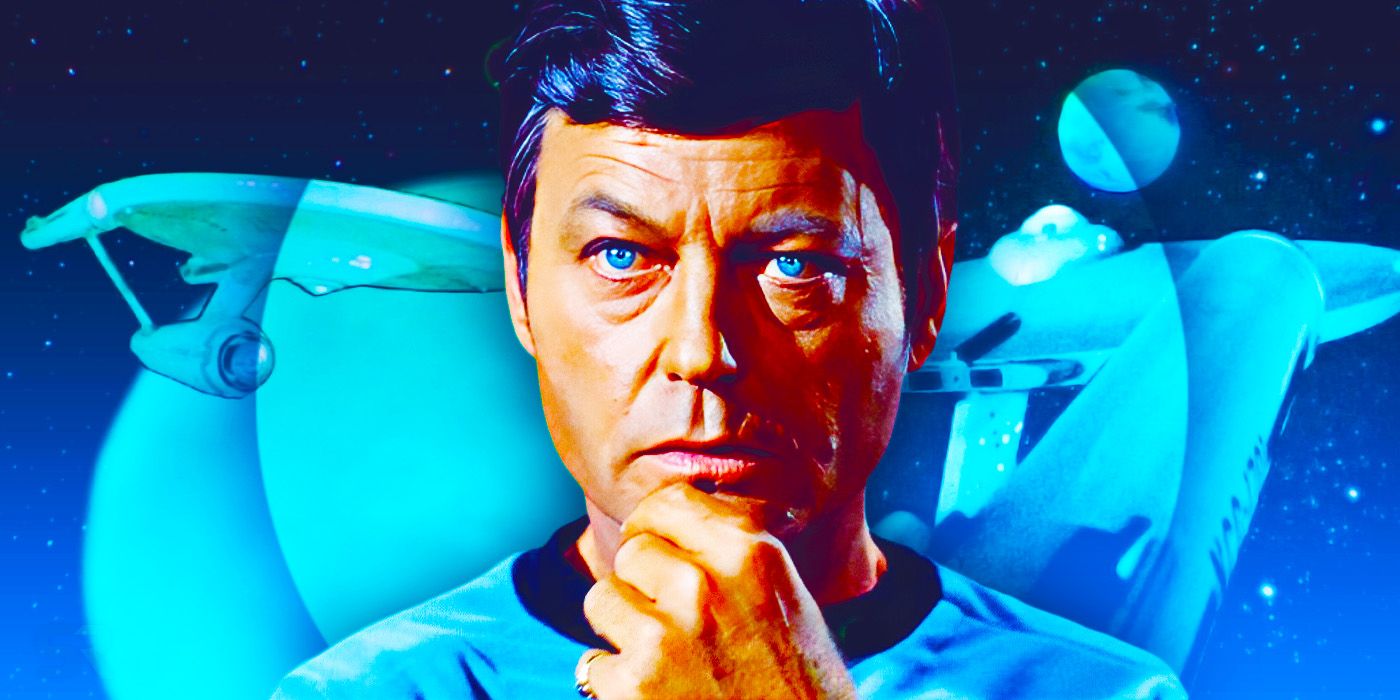
Summary
- Bones McCoy’s catchphrase, “I’m a doctor, not a […]”, adds humor and depth to his character across multiple tense and emotional situations.
- McCoy’s role as an accomplished Chief Medical Officer and counselor contributed significantly to the depth and dynamics of the original USS Enterprise crew.
- McCoy’s catchphrase has endured, influencing other series and movies throughout the Star Trek franchise.
DeForest Kelley starred as the acerbic and soulful Dr. Leonard “Bones” McCoy in Star Trek: The Original Series, charming audiences with his big heart, affectionate insults, and adaptable catchphrases. A Starfleet Lt. Commander, Dr. McCoy found a treasured place of prominence at the fandom’s core, serving as Chief Medical Officer on the USS Enterprise under the command of Captain James T. Kirk (William Shatner). Close friends with Kirk and Science Officer Mr. Spock (Leonard Nimoy), with whom he also shared an affectionate rivalry based largely on wordplay and insults, McCoy formed part of the TOS command triumvirate and brought a rich sense of emotional depth and maturity to Spock’s analytical, half-Vulcan/half-human logic and Kirk’s warm-hearted, passionate, and magnanimous soul.
McCoy’s adventures on the Enterprise led him to many meaningful moments, discoveries, and personal achievements. Very accomplished in his field, McCoy was proud of his hands-on, self-fashioned country doctor persona, tempering his charm with a grumpy yet approachable countenance. Also serving as an unofficial counselor, McCoy regularly observed and lent support to Captain Kirk and the Star Trek: The Original Series USS Enterprise crew. Fond of metaphor (to Kirk and Spock’s occasional exasperation), McCoy originated a widely recognized catchphrase that declared himself a doctor, dammit, not a something else! While the phrase is most commonly associated with Star Trek’s original McCoy, it’s an expression that has influenced and resurfaced across the franchise’s other works. Though this list is not exhaustive, here’s every time McCoy said “I’m a doctor, not a […]”, and 4 times it was said by somebody else.
11 Star Trek: The Original Series, Season 1, Episode 2 – “The Corbomite Maneuver”
“What am I, a doctor or a moon shuttle conductor?”
While Captain Kirk undergoes a quarterly physical in the ship’s Sickbay, the USS Enterprise encounters an unidentified cubical object during a routine star mapping assignment. With the object blocking the ship’s path and the Enterprise unable to maneuver around it, Spock instructs Lt. Hikaru Sulu (George Takei) to sound the alert and call Captain Kirk to the bridge.
In Sickbay, McCoy spots the alert but fails to draw Kirk’s attention to it in favor of completing the almost-finished medical exam. When Kirk spots the flashing light a few moments later, he immediately calls out McCoy’s lack of proper action, contacts Spock for more information, and leaves for the Bridge. Left alone, McCoy dryly responds to the mild criticism with “What am I, a doctor or a moon shuttle conductor? If I jumped every time a red light came on around here, I’d end up talking to myself.” It’s a light, amusing moment that subtly develops both characters and their personal-professional relationship.
10 Star Trek: The Original Series, Season 1, Episode 25 – “The Devil in the Dark”
“I’m a doctor, not a bricklayer.”
The USS Enterprise arrives at Janus VI to investigate an unidentified, deadly lifeform that is wreaking havoc on the workers and machinery at a mining operation. Spock theorizes that the creature is a silicon-based lifeform, not dissimilar in makeup to fibrous asbestos. Kirk seems to reach a tentative, peaceful understanding with the creature, following a cave-in while searching for the mysterious lifeform. Spock initiates a mind meld to attempt communication and learns that the creature – called a Horta – is generally peaceful and in extreme pain from an earlier phaser wound injury.
An interesting and admired episode, demonstrating Star Trek‘s respectable intent to seek out new life, to aid and befriend it, and boldly go.
Called to aid the Horta, McCoy’s scans reveal it to be “virtually made out of stone.” Despite declaring himself “a doctor, not a bricklayer,” unknowingly agreeing with Spock’s assessment that McCoy’s medical expertise will be useless, McCoy is nonetheless instructed to help his patient. In communication with the Enterprise, McCoy slathers the Horta’s wound with silicon-based thermal concrete and proudly indicates that he expects a full recovery. It’s an interesting and admired episode, demonstrating Star Trek’s respectable intent to seek out new life, to aid and befriend it, and boldly go.
9 Star Trek: The Original Series, Season 1, Episode 28 – “The City On The Edge Of Forever”
“I’m a surgeon, not a psychiatrist.”
Dr. McCoy accidentally overdoses on cordrazine and, hysterical, transports himself to the surface of a nearby planet, the center of the violent time disruptions affecting the Enterprise. Beaming down, an away team searching for McCoy locates an unusual time portal – the Guardian of Forever. Believing himself again in danger, McCoy jumps into an unspecified past and instantly collapses time. Realizing they must follow McCoy and undo what he changed, Kirk and Spock are transported to 1930s New York, where they meet Edith Keeler (Joan Collins) and quickly find work and shelter at the 21st Street Mission.
“The City on the Edge of Forever” explores themes of love and sacrifice.
When McCoy arrives, Keeler protects him and slowly nurses him back to health. She tells McCoy she has a friend who speaks about Earth as he does. McCoy responds, “I’m a surgeon, not a psychiatrist,” but the sad irony is that Keeler’s young friend is Captain James T. Kirk, in search of Dr. McCoy. The moment foreshadows the later tragedy – what McCoy had changed was preventing Edith Keeler’s death. Having fallen in love with her, Kirk must undo McCoy’s act and let her die. “The City on the Edge of Forever” explores themes of love and sacrifice, and is rightly regarded as one of Star Trek‘s best episodes.
8 Star Trek: The Original Series, Season 2, Episode 4 – “Mirror, Mirror”
“I’m a doctor, not an engineer.”
When an ion storm interferes with a transporter beam to the ship through a power surge in the transporter’s circuits, the USS Enterprise away team becomes trapped in a deadly parallel Mirror Universe with a vicious crew and a Spock with a beard. Stuck in a brutal and savage similar Enterprise, Kirk and the away team find themselves subject to potential torture, atrocity, and assassination.
Later theorizing about artificially reversing the transportation conditions to engineer a return to their own reality, Kirk and Scotty (James Doohan) hatch a plan for the team to escape. Pointing out that the plan would result in the evil universe’s Security Chief Hikaru Sulu being alerted, the USS Enterprise’s Chief Engineer says that he’ll need assistance but refuses Kirk’s silent volunteering by reasoning that he’d be too conspicuous. Both Kirk and Scott turn to McCoy, who points out that he’s “a doctor, not an engineer,” to which Scott responds, “Now, you’re an engineer.”
7 Star Trek: The Original Series, Season 2, Episode 6 – “The Doomsday Machine”
“I’m a doctor, not a mechanic.”
The USS Enterprise crew finds a distress signal from a devastated USS Constellation at the end of a trail of destroyed planets. Investigating the wrecked starship, Captain Kirk and his landing party find Commodore Matt Decker (William Windom) alone – the sole survivor of an encounter with a giant, planet-killing machine. Theorizing that the machine is an ancient, alien doomsday device, Kirk asks Dr. McCoy if he’d ever heard of one. The irascible medical officer uses his expressive catchphrase to answer negatively, “I’m a doctor, not a mechanic.”
The catchphrase’s inclusion here works effortlessly to develop the characters and contrast the stark nature of the scene’s realizations.
It’s an insignificant moment beyond the horror in the wake of the machine’s engagements, but the catchphrase’s inclusion here works effortlessly to effectively develop the characters and contrast the stark nature of the scene’s realizations. McCoy accompanies Decker back to the Enterprise, leading to a run of further tense and self-sacrificial attempts to destroy the doomsday machine.
6 Star Trek: The Original Series, Season 2, Episode 11 – “Friday’s Child”
“I’m a doctor, not an escalator.”
A USS Enterprise away team visits Capella IV to arrange for Starfleet mining rights to the planet’s rich topaline minerals. Negotiating with Akaar, the Teer of the Ten Tribes, Captain Kirk, Spock, and Dr. McCoy attempt to carefully navigate the Capellan’s complex taboos and volatile culture. Interrupted by the revelation of a rival negotiating party, the Klingons, the negotiations are soon overthrown by a developing coup. Maab (Michael Dante), a warrior in league with the Klingons, assassinates Akaar and declares himself the new Teer.
By cultural tradition, the life of Akaar’s heavily pregnant wife becomes forfeit. When Kirk attempts to prevent this execution, he inadvertently touches Eleen (Julie Newmar) – a forbidden act – and subsequently receives his own death sentence. Escaping to nearby foothills, Eleen allows McCoy to assist her in climbing the rocky outcrops. Struggling, McCoy requests assistance from Spock. When Eleen objects, McCoy declares himself “a doctor, not an escalator” and again calls for Spock’s assistance. Later proving his assertion, McCoy aids Eleen when she goes into labor and births her child. The baby is named Leonard James Akaar, after Dr. McCoy and Captain Kirk.
5 Star Trek: The Original Series, Season 2, Episode 11 – “The Deadly Years”
“I’m not a magician, Spock, just an old country doctor.”
A rapid aging disease levels the USS Enterprise landing party when they visit an experimental colony on Gamma Hydra IV on a routine resupply mission. As the crew struggles to understand and treat the mysterious illness and save their senior officers, Commodore Stocker (Charles Drake) renders imminent mortal peril when his urgency to reach Starbase 10 results in attacks on the Enterprise following a violation of the Romulan Neutral Zone.
Physically and visually aged and suffering from the effects of the aging disease, Spock queries an equally affected Dr. Leonard McCoy whether he can reduce Spock’s increased sensitivity to cold. McCoy shakes his head and informs the First Officer, “I’m not a magician, Spock, just an old country doctor,” and Spock takes the opportunity to add, “Yes, as I always suspected.” It’s an interesting, somewhat bittersweet moment as the two mildly engage in their characteristic banter but with a level of obvious friendly affection and lack of energy that starkly contrasts their usual exchanges.
4 Star Trek: The Original Series, Season 3, Episode 12 – “The Empath”
“I’m a doctor, not a coal miner.”
Assigned to evacuate a research station on Minara II, Captain Kirk, Spock, and Dr. McCoy are mysteriously transported below the planet’s surface for a series of manipulative experiments. Finding a timid and mute empath (Kathryn Hays), later named Gem by McCoy, Kirk and his friends embark on a challenging experience that threatens their survival and is designed to test Gem’s active morality. Experiencing torture and potential emotional devastation, the Enterprise officers must find an escape and help Gem.
It’s a sad and striking moment that escalates to McCoy sacrificing himself to ensure his friends’ survival.
Aesthetically creative, this disturbing episode was initially banned in the UK. Dramatic lighting and visuals are employed to highlight the narrative and draw attention to the perils facing the iconic Enterprise officers. In contemplating the circumstances, Spock notes their underground location and comments that some miners spend years below ground. McCoy points out that “he’s a doctor, not a coal miner.” As a weakened Kirk moves away from the conversation, having undergone torturous experiences at the hands of their captors, Bones and Spock’s worry about him becomes immediately visible. It’s a sad and striking moment that escalates to McCoy sacrificing himself to ensure his friends’ survival.
3 Star Trek (2009)
“I’m a doctor, not a physicist.”
J.J. Abrams’ Star Trek (2009) successfully rebooted the franchise, establishing important new characters and an alternate Kelvin Timeline. As the excellently cast new young crew of the USS Enterprise encounter Nero’s Narada and realize its impact on their universe, Spock (Zachary Quinto) considers the possibility of time travel. Dr. Leonard McCoy (Karl Urban) responds with a familiar catchphrase intended to feel organic in its reverence to Star Trek’s earliest series, exclaiming, “Dammit, man! I’m a doctor, not a physicist! Are you actually suggesting they’re from the future?”
Abrams’ Star Trek films have been highly commended for their casting of the original Enterprise crew.
It’s a nice nod to the franchise’s origins and an obvious consistency of a much-loved and celebrated character. Abrams’ Star Trek films have been highly commended for their casting of the original Enterprise crew, with each actor’s interpretation bringing new facets to the role while respecting and celebrating the earlier performances. Karl Urban’s Dr. McCoy comes closest to emulating DeForest Kelley’s original performance, with both perfect in the role.
2 Star Trek Into Darkness
“I’m a doctor, not a torpedo technician.”
Star Trek Into Darkness saw the Kelvin Timeline USS Enterprise crew return to the big screen. In the wake of Khan Noonien Singh’s (Benedict Cumberbatch) attacks on Starfleet and the death of Admiral Christopher Pike (Bruce Greenwood), Captain Kirk and the Enterprise crew are emotionally reeling and assigned on a questionable mission to Klingon space by the nefarious Admiral Alexander Marcus (Peter Weller). As Marcus uses the USS Vengeance against the Enterprise, Kirk and Khan quietly space dive across to the enemy ship. Meanwhile, Spock enlists the assistance of Dr. McCoy in a project with the experimental torpedoes used to conceal Khan’s genetically augmented crew.
In true Bones McCoy style, Karl Urban’s character responds to Spock with an exasperated exclamation that he’s “a doctor, not a torpedo technician” – subtly nodding back to Star Trek: The Original Series. When Khan later seizes power on the Vengeance and kills Admiral Marcus, he returns Kirk, Scotty, and Carol Marcus (Alice Eve) to the Enterprise and spares the heavily damaged ship from further attack in exchange for the torpedoes. With no other options, Spock agrees. Ultimately, it’s revealed that Spock and McCoy had removed Khan’s crew from the torpedo casings and kept them on board Enterprise.
1 Star Trek Beyond
“I’m a doctor, not a f–.”
When Krall (Idris Elba) attacks the USS Enterprise with his Swarm drone ships in search of the Abronath – an artifact to complete a powerful weapon – the crew is left scattered and stranded (or captured) on the nearby planet, Altamid. Slowly regrouping on the planet’s surface, Captain Kirk and his officers work to free the crew and repair the wrecked USS Franklin. As they escape on the restored NX starship, Spock and McCoy beam to a drone ship to disrupt the drones’ uniformity using VHF emissions provided by Jaylah (Sofia Boutella).
Dr. McCoy’s reaction to his role in the plan is amusing, with ‘surprised’ or ‘pleased’ very much an inexact sarcastic understatement – foreshadowed by Kirk’s “he’s gonna love this.” Naturally, McCoy reacts as expected, uttering, “I’m a doctor, not a f—,” as he beams away. Nonetheless, McCoy successfully pilots the drone amid the devastation of Krall’s swarm and successfully aids in stopping Krall’s attack on Starbase Yorktown – pivoting to rescue Kirk at the end of Star Trek Beyond.
McCoy exhibits significant emotional wisdom and ethical depth.
McCoy’s catchphrase is a charming quirk of his unique and multilayered personality. Irascible and somewhat pointed at a surface level, McCoy exhibits significant emotional wisdom and ethical depth over multiple episodes and movies. Influencing subsequent franchise series and movies, Dr. Leonard McCoy’s most famous saying is adaptable and dynamic and an immediately identifiable feature of Star Trek’s impressive legacy.





